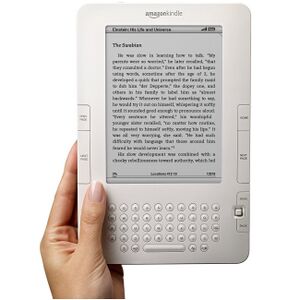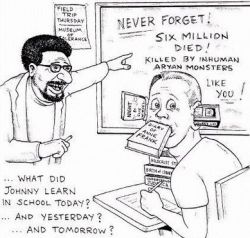- Portals
- The Current Year
- ED in the News
- Admins
- Help ED Rebuild
- Archive
- ED Bookmarklet
- Donate Bitcoin
Contact an admin on Discord or EDF if you want an account. Also fuck bots.
Kindle

The Kindle e-book reader is a device that allows a person to download books and then read them on a page-like screen. The Kindle is also a travesty of civil rights violations because the damn thing cannot be operated by blind people. Because of this, books themselves have also been targeted as a violation of the Americans with Disabilities Act.
The Story
Recently, several universities around the country attempted to step into the 21st century by adding the Kindle as part of their curriculums. There were not many classes involved, but the rewards could be great:
- cheaper books for students
- less hassle for teachers
- greater flexibility concerning course material
- greatly reduced waste and environmental impact due to the fact that no paper would be used
Everything seemed to go well. The students were happy with their Kindles and the universities were happy because this was obviously a giant leap forward technologically speaking, but whoa there fella...suddenly somebody had to bring this great idea to a screeching halt.
The Blind
It seems that blind people cannot turn on a Kindle device because…well, because they are blind. This small fact doomed the Kindle in the classroom and ended the program. Since blind people can’t turn on a Kindle, the Kindle violates the Americans with Disabilities Act, and thus are violating Americans civil rights. The Obama administration immediately filed suit to stop the process.
Additionally, one has to wonder why simple books themselves are not outlawed at the same time, as they too cannot be operated by blind people either, and thus violate the same law.
Other things blind people cannot operate, and thus are illegal under the ADA:
- Automobiles
- Photoshop
- Forklifts
- Tractors
- Semi-trucks with trailers
- Bazookas
- Fairchild Republic A-10 Thunderbolt IIs
Theories

Why did the Obama administration file suit to have the Kindle removed from university classrooms? Despite the fact that people think that Obama is white-knighting for the blind, the real reason is money. But wait, how can the federal government lose money in this process, since they weren’t involved on any level with the Kindle program? There are several theories, let’s take a look:
- Teachers (and ultimately the teachers union) will earn less money because Kindle e-books are much cheaper than real paper books. Since many teachers publish their own books for use during their classes, they stand to make significantly less each school year.
- The whole system is set up to use costly published paper books. Upsetting this balance will lead to job loss and less revenue for colleges. This will have a negative effect on taxes collected from schools.
- Public schools will have to follow suit. Once universities make this sort of thing mandatory, local, government run schools will have to implement e-readers as well. A costly and time consuming endeavor.
- TINFOIL HAT THEORY – A great deal of control is exerted over students nationwide through the control of textbooks. Since the government pretty much decides which books students will receive, they can dictate what they are actually learning. Since e-book publishing can lead to loss of this control, the whole idea had to be tossed out the window. Both progressives and conservatives understand the basic idea that “he who controls education, controls the culture.”
Where Do We Go?
Until blind people can turn on a device as simple as an mp3 player, we are gonna be stuck using paper books in schools. Stuck, that is, until somebody else figures out that paper books themselves are violating the ADA and we begin burning those too.
Transcript
[[Full Transcript]]
June 29, 2010
Dear College or University President:
We write to express concern on the part of the Department of Justice and the Department of Education that colleges and universities are using electronic book readers that are not accessible to students who are blind or have low vision and to seek your help in ensuring that this emerging technology is used in classroom settings in a manner that is permissible under federal law. A serious problem with some of these devices is that they lack an accessible text-to-speech function. Requiring use of an emerging technology in a classroom environment when the technology is inaccessible to an entire population of individuals with disabilities – individuals with visual disabilities – is discrimination prohibited by the Americans with Disabilities Act of 1990 (ADA) and Section 504 of the Rehabilitation Act of 1973 (Section 504) unless those individuals are provided accommodations or modifications that permit them to receive all the educational benefits provided by the technology in an equally effective and equally integrated manner.
The Departments of Justice and Education share responsibility for protecting the rights of college and university students with disabilities. The Department of Justice is responsible for enforcement and implementation of title III of the ADA, which covers private colleges and universities, and the Departments of Justice and Education both have enforcement authority under title II of the ADA, which covers public universities. In addition, the Department of Education enforces Section 504 with respect to public and private colleges and universities that receive federal financial assistance from the Department of Education. As discussed below, the general requirements of Section 504 and the ADA reach equipment and technological devices when they are used by public entities or places of public accommodation as part of their programs, services, activities, goods, advantages, privileges, or accommodations.
Under title III, individuals with disabilities, including students with visual impairments, may not be discriminated against in the full and equal enjoyment of all of the goods and services of private colleges and universities; they must receive an equal opportunity to participate in and benefit from these goods and services; and they must not be provided different or separate goods or services unless doing so is necessary to ensure that access to the goods and services is equally as effective as that provided to others.
Under title II, qualified individuals with disabilities may not be excluded from participation in or denied the benefits of the services, programs, or activities of, nor subjected to discrimination by, public universities and colleges. Both title II and Section 504 prohibit colleges and universities from affording individuals with disabilities with an opportunity to participate in or benefit from college and university aids, benefits, and services that is unequal to the opportunity afforded others. Similarly, individuals with disabilities must be provided with aids, benefits, or services that provide an equal opportunity to achieve the same result or the same level of achievement as others. A college or university may provide an individual with a disability, or a class of individuals with disabilities, with a different or separate aid, benefit, or service only if doing so is necessary to ensure that the aid, benefit, or service is as effective as that provided to others.
The Department of Justice recently entered into settlement agreements with colleges and universities that used the Kindle DX, an inaccessible, electronic book reader, in the classroom as part of a pilot study with Amazon.com, Inc. In summary, the universities agreed not to purchase, require, or recommend use of the Kindle DX, or any other dedicated electronic book reader, unless or until the device is fully accessible to individuals who are blind or have low vision, or the universities provide reasonable accommodation or modification so that a student can acquire the same information, engage in the same interactions, and enjoy the same services as sighted students with substantially equivalent ease of use. The texts of these agreements may be viewed on the Department of Justice’s ADA Web site, www.ada.gov. (To find these settlements on www.ada.gov, search for “Kindle.”) Consistent with the relief obtained by the Department of Justice in those matters, the Department of Education has also resolved similar complaints against colleges and universities.
As officials of the agencies charged with enforcement and interpretation of the ADA and Section 504, we ask that you take steps to ensure that your college or university refrains from requiring the use of any electronic book reader, or other similar technology, in a teaching or classroom environment as long as the device remains inaccessible to individuals who are blind or have low vision. It is unacceptable for universities to use emerging technology without insisting that this technology be accessible to all students.
Congress found when enacting the ADA that individuals with disabilities were uniquely disadvantaged in American society in critical areas such as education.6 Providing individuals with disabilities full and equal access to educational opportunities is as essential today as it was when the ADA was passed. In a Proclamation for National Disability Employment Awareness Month, President Obama underscored the need to “strengthen and expand the educational opportunities for individuals with disabilities,” noting that, “[i]f we are to build a world free from unnecessary barriers . . . we must ensure that every American receives an education that prepares him or her for future success.” http://www.whitehouse.gov/the-press-office/presidential-proclamation-national-disability-employment-awareness-month (September 30, 2009) (emphasis added).
Technology is the hallmark of the future, and technological competency is essential to preparing all students for future success. Emerging technologies are an educational resource that enhances learning for everyone, and perhaps especially for students with disabilities. Technological innovations have opened a virtual world of commerce, information, and education to many individuals with disabilities for whom access to the physical world remains challenging. Ensuring equal access to emerging technology in university and college classrooms is a means to the goal of full integration and equal educational opportunity for this nation’s students with disabilities. With technological advances, procuring electronic book readers that are accessible should be neither costly nor difficult.
We would like to work with you to ensure that America’s technological advances are used for the benefit of all students. The Department of Justice operates a toll-free, technical assistance line to answer questions with regard to the requirements of federal laws protecting the rights of individuals with disabilities. For technical assistance, please call (800) 514-0301 (voice) or (800) 514-0383 TTY). Specialists are available Monday through Friday from 9:30 AM until 5:30 PM (ET) except for Thursday, when the hours are 12:30 PM until 5:30 PM. These specialists have been trained specifically to address questions regarding accessible electronic book readers. Colleges, universities, and other stakeholders can also contact the Department of Education’s Office for Civil Rights for technical assistance by going to OCR’s Web site at http://wdcrobcolp01.ed.gov/CFAPPS/OCR/contactus.cfm.
We appreciate your consideration of this essential educational issue and look forward to working with you to ensure that our nation’s colleges and universities are fully accessible to individuals with disabilities.
Sincerely,
Thomas E. Perez
Assistant Attorney General
Civil Rights Division
U.S. Department of Justice
Russlynn Ali
Assistant Secretary
for Civil Rights
U.S. Department of Education
See Also
External Links
- ADA home page
- Bureaucracy kills Kindle
- Avoid use of readers in classroom
- GUIDE FOR PEDOPHILES NOW AVAILABLE ON THE KINDLE
| Kindle is part of a series on Language & Communication | |
|---|---|
Languages and Dialects • Grammar, Punctuation, Spelling, Style, and Usage • Rhetorical Strategies • Poetry •
The Politics of Language and Communication • Media • Visual Rhetoric
Click topics to expand |

|
